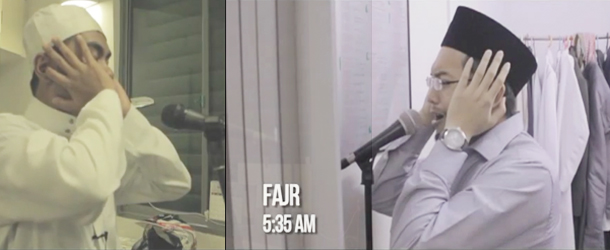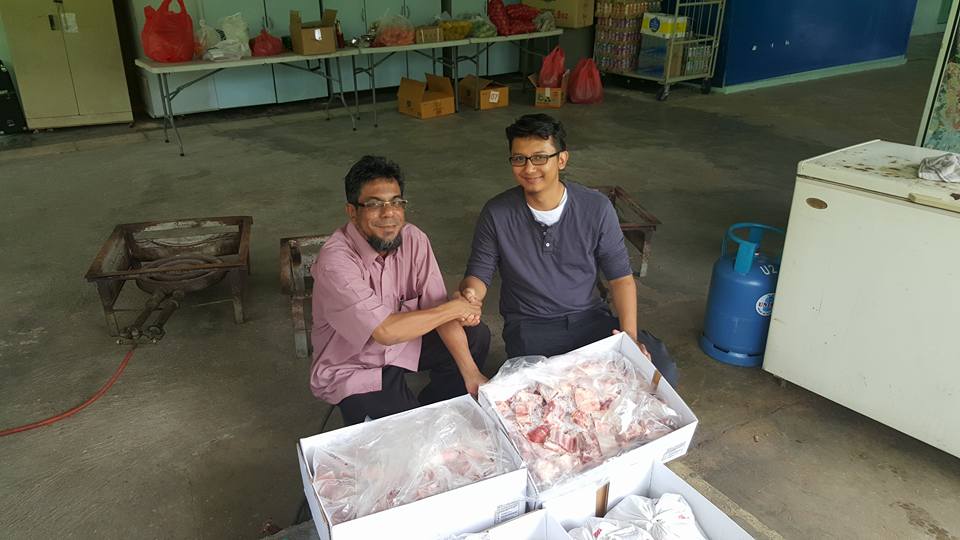“O believers, when proclamation is made for prayer on the Day of Congregation, hasten to God’s remembrance and leave business aside; that is better for you, if you did but know.” (Quran 62:9)
- الله أكبر
Allaahu Akbar (2x)
“Allah is the greatest” - الله أكبر
Allaahu Akbar (2x)
“Allah is the greatest” - أشهد أن لا إله إلا الله
Ashhadu Allah ilaaha illa-Lah
“I bear witness that there none worthy of worship except God” - أشهد أن لا إله إلا الله
Ashhadu Allah ilaaha illa-Lah
“I bear witness that there none worthy of worship except God” - أشهد أن محمد رسول الله
Ash Hadu anna Muhamadan rasuulullah
“I bear witness that Muhammad is the Messenger of God” - أشهد أن محمد رسول الله
Ash Hadu anna Muhamadan rasuulullah
“I bear witness that Muhammad is the Messenger of God”< - حي على الصلاة
Hayya’ alas Salaah
“Come to prayer” - حي على الصلاة
Hayya’ alas Salaah
“Come to prayer” - حي على الفلاح
Hayya’ alal Falaah
“Come to felicity” - حي على الفلاح
Hayya’ alal Falaah
“Come to felicity” - As-Salatu Khayrun-minan Nawm (2x)
“Prayer is indeed better than sleep.” - الله أكبر
Allaahu Akbar(2x)
“God is the greatest” - لا إله إلا الله
Laa ilaaha illa-Lah
“There is none worthy of worship except God”
I toss and turn in my sleep, trying to fight the drowsiness that threatened to drown me in my bed.
“It’s time for Fajr…” I told myself, “Get up, get up, get up.”
I swing my legs around until it hits the floor. I stretch my arms and yawn, then rub my eyes vigorously. The familiar call of adhan from the nearby mosque had done its’ job at rousing me from my stupor, telling me that it was time to meet God in prayer.
I’d always liked the adhan, even though it was not very welcoming when I was younger as it meant being forced to wake up to go to school. But as I grew older I learned to love the calming effect the adhan gave me, and the reminder that it was time for my 5 prayers. It was melodious, deep and gentle. It was lovely to think that the first thing I hear when I awaken was praise to Allah s.w.t.
Bed creaking, I then shuffle to the toilet to take my ablution, repeating an age-old routine from when I was a little boy.
Little did I know, that familiar regimen would soon screech to a halt.
The next morning, I was roughly awoken by my father.
“Abang, wake up. Time for Fajr. Hurry, it’s getting late.”
Wait, what?
I must be dreaming. Where was the usual adhan from the mosque? Did I miss it? I checked the clock on my bedside table. No; the adhan was supposed to already have taken place. I’d never been in sleep so deep that I could not hear the call to prayer; besides, it was so loud and clear. To awaken to a simple “Wake up” did not feel right with me, almost vulgar even, compared to the silvery crooning of “Allahu Akbar (Allah is the Greatest).”
I finished Fajr in a state of confusion. Wanting to clear my doubts, I walked hurriedly into the living room to find my dad.
He seemed to be in a rush to get out of the house. “Abah!” I called out to stop him.
He turned to look at me for a split second before returning his focus on wearing his shoes. “Abang, Abah has to go the mosque. The muezzin passed away this morning, just as he was about to give the adhan. I have to go and help to settle his funeral. Stay here with your mother and sisters until I get back.”
What? “The who?” I asked.
“The muezzin,” my father explains, sighing, “The one who makes the call to prayer. He’s the one whose voice you hear every day.”
_____________________________________________________________________________________________
Sometimes we tend to view adhan, the call to prayer, as merely an ‘it’, without thinking about the man behind the voice. They are called the ‘muezzin’, or sometimes more commonly known as the Bilal.
The Muezzin or the Bilal are officials who proclaim the call to prayer. The history of how the muezzin came about is a powerful one, starting with the infamous account of Bilal bin Rabah (r.a.).
Bilal bin Rabah was a mere slave from the land of Abyssinia (now known as Ethiopia), bought by the wealthy and equally merciless Umayya ibn Khalaf, who was a devout idol-worshipper.
He, like many other slaves, had known nothing but unfairness and harsh treatment from the time they were born, so when he heard of the Prophet Muhammad s.a.w and his glorious message of justice and mercy, he took immense comfort in it.
“According to biographer Ibn Ishaq and others, Bilal suffered terribly for his immediate acceptance of Muhammad’s message. It is said that he was beaten mercilessly, dragged around the streets and hills of Mecca by his neck, and subjected to long periods without food or water. His owner Umayya ibn Khalaf reportedly, “would bring him out at the hottest part of the day and throw him on his back in the open valley and have a great rock put on his chest; then he would say to him, ‘You will stay here till you die or deny Muhammad and worship al-Lat and al-’Uzza”. Bilal would not renounce Islam, and amidst his suffering he uttered only one word – Ahad (meaning One God).
News of the slave who cried out ‘God is One!’ even in the midst of torture soon reached Prophet Muhammad and his companions. Abu Bakr, Prophet Muhammad’s closest friend and a wealthy trader of equal status to Umaya was sent to investigate. He came upon the open field where Bilal was being tortured for amusement. Abu Bakr did not lose his temper, for that was not his way, but he remonstrated with the torturers. He said to Umaya, “Have you no fear of God that you treat this poor man like this?” He replied saying: “You are the one who corrupted him, so you save him from his plight!” Abu Bakr replied: “Then sell him to me, name your price.” Umaya, was a businessman and could not give up making a profit, so he sold Bilal for a good price. To humiliate Bilal, he added: “I would have sold him to you even if you had offered me only an ounce of gold.” Abu Bakr answered: “I would have bought him even if you had asked for one hundred ounces.””
– http://www.islamreligion.com/articles/4722/viewall/
His bravery, immense courage and infallible faith attracted the Prophet s.a.w to him, and from then on they shared a very close bond. After the construction of Masjid Quba, the Prophet s.a.w then asked Bilal to make the very first adhan. It is a great mark of respect to Bilal that muezzins are also referred to as the ‘Bilal’ – someone who was once a slave, of dark skin color, and who was non-arabic. It goes to show the wisdom and beauty of the Islamic faith that race; social standing or skin color had no effect on one’s iman, especially in such a time.
In short, after the death of the Prophet s.a.w, Bilal became too overcome with grief and departed for Damascus, where he would also pass away later.

This goes to show the great importance of the muezzin, even though most of the times they are only heard and not seen – there is a profound beauty in calling others to prayer that only they can truly feel and comprehend.
_____________________________________________________________________________________________
My own grandfather was a muezzin. His name was Haji Hassan Bin Haji Harun, and he used to make the call for prayer from the Ghufran Mosque in Tampines. He passed away when I was in Primary 5, but I can still remember him cycling home from the mosque, with his white songkok, distributing to his children and grand-children food from the mosque.
I also had my weekend madrasah lessons in the Ghufran Mosque at that time, where we would also do our prayers for zuhr. As I write the story of the boy and his lost muezzin above, I feel a pang of sadness and regret.
For who had called me out to the zuhr prayer?
The voice had sometimes seemed so familiar yet I never gave it much thought.
Only in later years, after his death, then it hit me. The muezzin had been my own grandfather.
Below is a short docu-film on the muezzins in Singapore:









